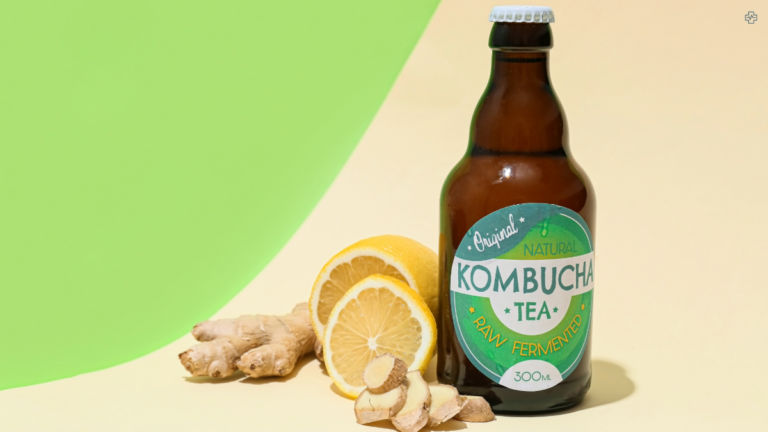Kombucha is one of those celebrated dieteray choices of our times. Who would have thought? The trending fermented tea has taken the modern wellness world by storm. However, its recent popularity mirrors a larger trend of rediscovering ancient fermented foods with supposed health benefits. Foods like kefir, kimchi, and sauerkraut have experienced similar revivals, celebrated for their probiotic content and digestive support. Kombucha’s journey from ancient China to Western supermarkets speaks volumes about its appeal, but as with any health craze, it’s important to examine the science behind the claims.
Kombucha is believed to have originated in Northeast China around 220 B.C. during the Tsin Dynasty, where it was revered as the “Tea of Immortality” due to its supposed health-promoting properties. The name “kombucha” is thought to come from a Korean physician, Dr. Kombu, who allegedly brought the fermented tea to Japan in 414 A.D. for Emperor Inkyo. Although the historical accuracy of this tale is debated, kombucha’s centuries-old roots are undeniable. Originally brewed with black tea and sugar, kombucha can now be made using various bases, including herbal teas, coffee, and even milk, resulting in different variations of this popular drink.
Kombucha’s Unique Fermentation Process
The key to kombucha’s distinctive taste and health benefits lies in its fermentation process. At the heart of this is the SCOBY (Symbiotic Culture Of Bacteria and Yeast), a gelatinous disc that initiates fermentation by consuming the sugar in the tea and converting it into acids, enzymes, and probiotics. This process also produces natural carbonation, giving kombucha its signature fizz. As with other fermented beverages, kombucha contains a small amount of alcohol, typically less than 0.5% in commercial varieties, which classifies it as non-alcoholic in most countries. However, home-brewed kombucha can exceed this threshold, depending on fermentation times.
Each SCOBY is unique, developing its own blend of bacteria and yeast that can affect the flavour and texture of the drink. This individuality explains why kombucha can taste slightly different from batch to batch. Additionally, kombucha’s second fermentation process, often carried out after bottling, allows for natural carbonation as the yeast continues to consume residual sugars, producing CO₂ that remains trapped in the sealed bottle.
Health Claims and Probiotic Potential

Kombucha’s growing popularity is often linked to its perceived health benefits. Advocates claim that it can improve digestion, support the immune system, and detoxify the body. However, much of the scientific evidence supporting these claims is still in its early stages. Most research has been conducted in vitro or on animals, leaving a gap in human clinical trials. Despite this, kombucha’s probiotic content is one area where its benefits are well-supported. Probiotics, the beneficial bacteria present in fermented foods, play a crucial role in maintaining gut health, which is connected to digestion, immune function, and even mental well-being.
Probiotics in kombucha can introduce beneficial bacteria to the gut, supporting the balance of the microbiome. Some studies suggest that a healthy gut may have broader health implications, including enhancing the gut-brain axis, which could positively impact mental health. However, the effectiveness of probiotics varies depending on the strains and quantities present in each batch of kombucha, and it’s important to remember that kombucha, like other fermented foods, is classified as a food rather than a medication. Therefore, the quality and consistency of the probiotics can vary between brands and batches.
From Tea to Leather: Kombucha’s Versatile Uses
While kombucha is mainly consumed as a beverage, its versatility goes beyond the glass. If left to ferment too long, kombucha will turn into vinegar, which can be used similarly to apple cider vinegar in cooking and cleaning. Some enthusiasts even intentionally brew kombucha vinegar for its culinary uses, particularly in salad dressings and marinades.
Additionally, the SCOBY itself has found an unexpected use in the world of art and sustainable fashion. When dried, the SCOBY takes on a leather-like texture, making it a popular material for vegan leather alternatives. Artists and eco-conscious designers have experimented with this organic material, creating everything from clothing to accessories and even art installations. This creative reuse of the SCOBY adds another layer to kombucha’s appeal, especially for those seeking eco-friendly and sustainable solutions.
Fermented Beverages Comparison
| Feature | Kombucha | Kefir | Yogurt |
|---|---|---|---|
| Base Ingredient | Tea | Milk | Milk |
| Fermentation Process | Fermented with a symbiotic culture of bacteria and yeast (SCOBY) | Fermented with kefir grains (a symbiotic culture of bacteria and yeast) | Fermented with bacteria (lactobacillus) |
| Taste | Tangy, slightly sweet or sour | Tangy, slightly acidic | Tart, creamy |
| Probiotics | Contains beneficial probiotics | Contains beneficial probiotics | Contains beneficial probiotics |
| Nutrients | May contain vitamins, minerals, and antioxidants | May contain vitamins, minerals, and probiotics | Contains calcium, protein, and vitamins |
| Health Benefits | Potential benefits for digestive health, immune function, and weight management | Potential benefits for digestive health, immune function, and bone health | Potential benefits for digestive health, immune function, and weight management |
| Alcohol Content | Typically contains a small amount of alcohol (less than 0.5%) | Typically contains a small amount of alcohol | Typically contains no alcohol |
Kombucha’s Global Spread and the Surge in Popularity
Though kombucha has ancient roots, it was only in the 21st century that it gained significant traction in Western markets, spurred by the health food movement. Searches for “kombucha tea near me” tripled in 2023, reflecting its growing demand, particularly for fresh, unpasteurised versions believed to contain higher levels of probiotics. Kombucha has also evolved to cater to modern tastes, with manufacturers introducing a variety of flavours, such as ginger, lemon, and hibiscus, during the second fermentation process.
The rise of kombucha has not only been driven by its health claims but also by its cultural versatility. In Russia and Eastern Europe, it is known as “mushroom tea” due to the appearance of the SCOBY. In Japan, kombucha is called “kocha kinoko,” translating to “black tea mushroom.” These regional variations highlight kombucha’s adaptability across different cultures.
Economic and Global Trade Impact
Kombucha’s surge in popularity has also had significant economic implications. The global kombucha market was valued at over £2.5 billion in 2022, with forecasts predicting steady growth as the beverage becomes more mainstream. Countries like the United States, Australia, and the UK have seen a boom in kombucha production, while exports of the beverage to countries with emerging markets in health-conscious consumer goods continue to rise.
As kombucha’s demand increases, so too does its presence in global trade. Many countries have started to export the drink, and kombucha has become a staple in health food stores worldwide. In 2021, kombucha trade exceeded £500 million in exports, reflecting its growing significance in international markets. With the expansion of kombucha’s production and its continued appeal as a health-forward beverage, the economic and cultural impact of kombucha shows no signs of slowing down.

